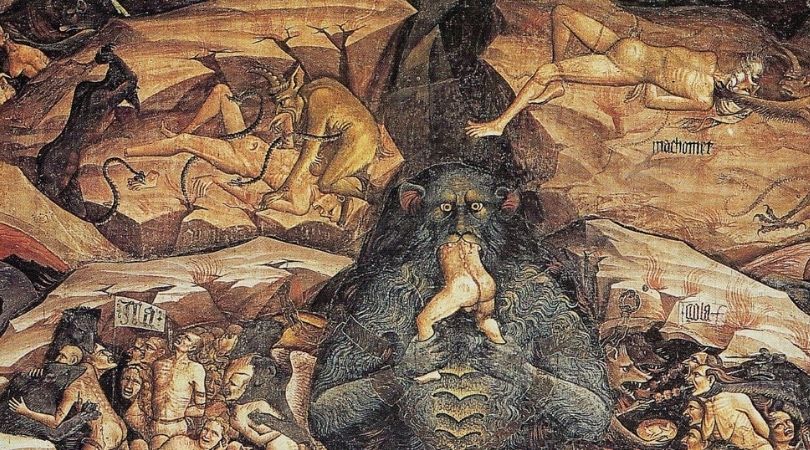Muslim Worship In Christian Cathedrals
by TBG

Christianity and Islam are two discrete and mutually conflicting belief systems...The Iftar forms a significant part of Muslim religious observance with the shahada being one of the central credal statements in Islam.
Muslim Iftar in Manchester Cathedral#Muslim #Iftar #Manchester #Cathedral pic.twitter.com/rgg6ONvn13
— IPNA (@irannewsvideo) March 30, 2023
By L.I.
Last week marked the beginning of Ramadan, during which observant Muslims gathered at sunset to take their Iftar: a ceremonial meal that breaks the rigorous fasting observed during the day. Iftar is generally held in mosques, yet in recent years Anglican bishops have thrown wide the cathedral doors for the observance of iftar within their walls. Manchester Cathedral is the latest to hop on the multifaith bandwagon, welcoming members of the Muslim community who flocked to recite the shahada beneath the gothic nave last week.
The Iftar forms a significant part of Muslim religious observance with the shahada being one of the central credal statements in Islam. This creed refers not only to the prophet Muhammad as “God’s Messenger” but further describes God as “one”. It does not take a theologian to recognise that these statements are in direct opposition to the creeds of Christianity, which does not consider Muhammad a genuine prophet at all and teaches the doctrine of the Trinity.
It is clear, therefore, that for the clergy to permit the observance of the shahada within cathedral walls is not only remiss but misleading, sacrilegious and even degrading. To permit a religion openly antagonistic and in direct opposition to Christian values to pray in a church represents the negligence of certain bishops in fulfilling their task of defending and spreading the Christian faith. One might be forgiven for forgetting that Anglicanism is the established Church of England when so much laxity is shown toward religions and creeds that are in clear antithesis to its teachings and values.

Despite the multiculturalists and multifaithists many and varied attempts, there is no escape from the reality that Christianity and Islam are two discrete and mutually conflicting belief systems. There is no world in which both Christianity and Islam can equally be right. If, as Christianity claims, Jesus is the Messiah and Son of God, He cannot logically be a somewhat important prophet second to Muhammad. This is a point on which all true Christians and Muslims must agree, unless each is satisfied with having their faith deliquesced into a melting pot of syncretic pulp. And the multifaithists may wish to take a step back and consider: if the two faiths are so compatible, then why is the hospitality not being reciprocated? There doesn’t seem to be many mosques throwing wide their doors to welcome in Christian worshippers for prayer in a spirit of mutual tolerance – and quite rightly so.
The Church of England has recently issued guidance to churches and cathedrals on how to host an iftar. This, and the fact that these ceremonies are being held in major cathedrals, presumably with the approval of their respective bishops, suggests an affront on traditional Christianity from the highest echelons of the Church. To what extent Christians within the CoE are happy with these recent developments is unclear, but it is reasonably to be assumed that much of this is a effort of an overly enthused minority in positions of significant ecclesiastical authority.
In his 2015 work, The Strange Death of Europe, Douglas Murray writes of Britain’s civilisational loss of confidence in the wake of the two World Wars that rocked the foundations of our culture. Murray states that a healthy degree of respect and gratitude toward European traditional and religious heritage was lost along with that confidence and that a kind of self-loathing has replaced it. This has resulted in a desperate drive to gratify what social science calls ‘the Other’: taking the joke about a liberal being so open-minded that he won’t take his own side in a fight to another level. The Church is no exception here and the gradual but steady decline of the status of Christianity in Britain is rightfully a cause of serious concern for traditional churchgoers.
There is no simple answer to the question of what can be done to stave off the onslaught of multifaithist agenda that is vitiating the Church. The disinterest in patriotism and the neglect of cultural conservation are certainly factors to blame and without them first being addressed, it is difficult to imagine a change of direction in the ecclesiastical status of our country. One way or another, however, something must be done, if there is to be any hope of preserving traditional Christian faith among the people of Britain, whom it has illuminated for over 1,500 years.
Other articles can be found here. If you have something to add, please leave a comment below. We will be moving away from Disqus soon, allowing us to remove these obligatory adverts.